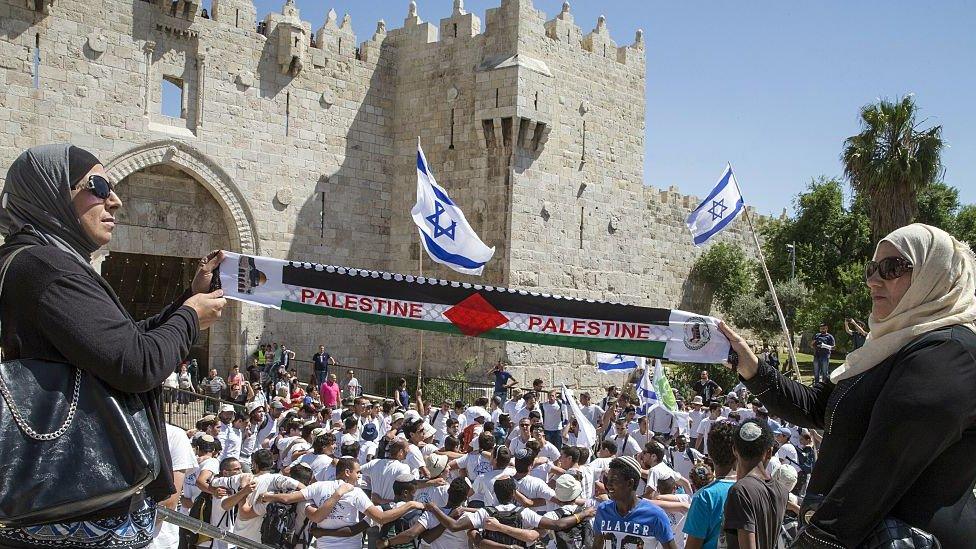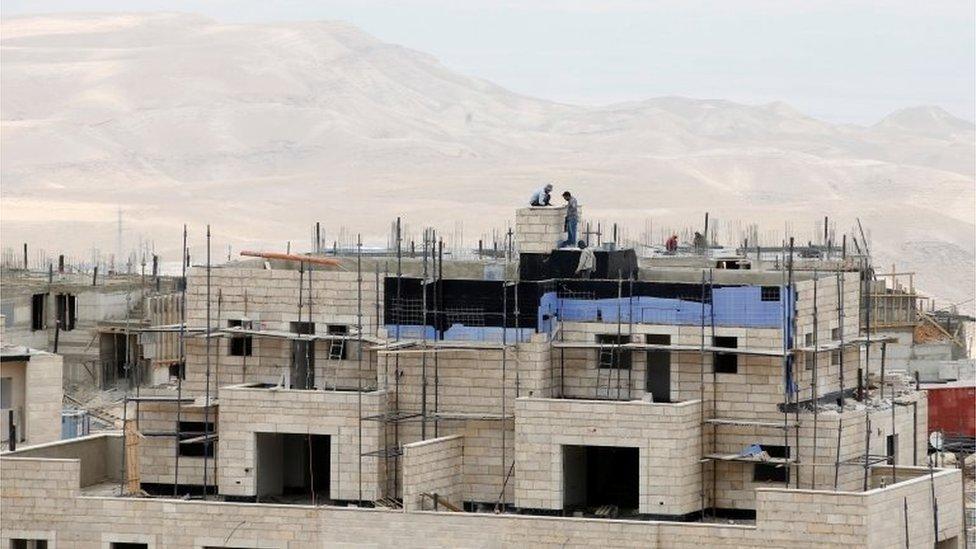Israel and Palestinians: Powers warn of 'perpetual conflict'
- Published

Two decades of on-off peace talks have not solved the conflict
A group of key world powers has warned of "perpetual occupation and conflict" between Israelis and Palestinians.
In a long-awaited report, external, the so-called Quartet said ongoing violence, Israeli settlement-building and Palestinian splits were undermining peace hopes.
Israel insisted it was a "myth" that settlements were an obstacle.
The Palestinians said responsibility should not be "equalised" between "people under occupation" and a "foreign military occupier".
Heightened tensions
The Quartet - made up of the US, UN, EU and Russia and formed in 2002 - called on both sides to take positive action and said only direct bilateral negotiations could end the conflict.
The last round of direct talks between Israel and the Palestinians came to an end amid acrimony in April 2014.
Friday's report identifies three main areas driving the conflict:
Continuing violence, terrorism and incitement
Israeli settlement expansion
Lack of control of Gaza by the West-Bank based Palestinian Authority
The report comes at a time of heightened tension between Israel and the Palestinians, with a wave of deadly attacks by Palestinians on Israelis and a tightening by Israel of security measures against Palestinians.
Thirty-five Israelis have been killed in knife, gun and car-ramming attacks since October. More than 200 Palestinians - mostly attackers, Israel says - have also been killed in that period.
Incitement condemned
Israel says Palestinian incitement has fuelled the attacks. The Palestinian leadership has blamed frustration rooted in decades of Israeli occupation.
"Palestinian leaders have not consistently and clearly condemned specific terrorist attacks. And streets, squares and schools have been named after Palestinians who have committed acts of terrorism," the report says.
It called on the Palestinian Authority to "act decisively" against incitement "including by clearly condemning all acts of terrorism".
Israel's Prime Minister's Office welcomed "the Quartet's recognition of the centrality of Palestinian incitement and violence to the perpetuation of the conflict".
However, Chief Palestinian negotiator Saeb Erekat was critical.
"It does not meet our expectations as a nation living under a foreign colonial military occupation; wherein it attempts to equalise the responsibilities between a people under occupation and a foreign military occupier," he said in a statement on behalf of the Palestine Liberation Organisation (PLO), the dominant Palestinian movement.
'Steady erosion'
The report also highlights Israel's settlement policy in the occupied West Bank, which it says "is steadily eroding the viability of the two-state solution".
"Israel should cease the policy of settlement construction and expansion, designating land for exclusive Israeli use and denying Palestinian development," it says.
It says Israel has "effectively" stopped the transfer of powers to Palestinian civilian authorities in part of the West Bank designated as Area C under interim peace accords.
At least 300,000 Palestinians live in Area C, which comprises about 60% of the West Bank. The report said Israel had taken about 70% of Area C for its exclusive use.
But Israel rejected the criticism, saying it did not accept suggestions of "moral equivalence between construction and terrorism".
"We regret the failure of the Quartet to address the real core of the conflict: the persistent Palestinian refusal to recognise Israel as the nation-state of the Jewish people in any boundaries," the Prime Minister's Office added.
"It is troubling that the Quartet appears to have adopted the position that the presence of Jews living in the West Bank somehow prevents reaching a two-state solution.

The Quartet called on Israel to stop settlement construction
The Palestinians seek to establish an independent state in the West Bank, with East Jerusalem as its capital, and have long complained that Israel's settlement policy threatens its viability.
Israel has said it is willing to make territorial concessions in a final peace agreement while holding on to the most populated settlement blocs close to its boundary with the West Bank.
About 570,000 Israelis live in more than 100 settlements built since Israel's 1967 occupation of the West Bank and East Jerusalem. The settlements are considered illegal under international law, though Israel disputes this.
The report also points to the continuing splits in Palestinian governance of the West Bank and Gaza as an obstacle to peace, saying the territories "should be reunified under a single, legitimate and democratic Palestinian authority".
There has been a deep rift between the two main Palestinian factions since 2007, when Hamas, which won elections the previous year, ousted forces loyal to President Mahmoud Abbas in Gaza and set up a rival government there.
A 2014 reconciliation agreement between the internationally recognised Palestinian Authority and Hamas has failed to take hold.